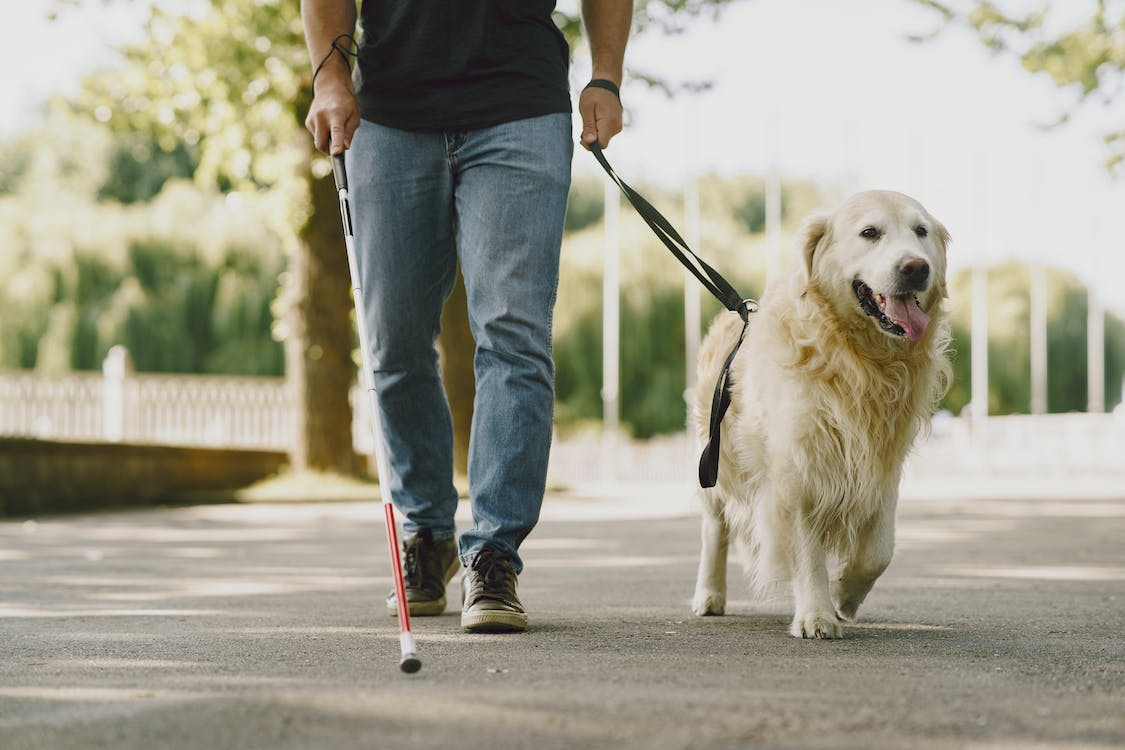News
How Service Dogs Transform the Lives of People with Disabilities


Image via Pexels
Maryland Works advocates to expand employment, increase economic and entrepreneurship opportunities for people with disabilities. Contact us today to learn more! 410-381-8660
How Service Dogs Transform the Lives of People with DisabilitiesService dogs have long been known to provide invaluable support and assistance to individuals with disabilities. These specially trained animals are not only loyal companions, but they enable their handlers to live more independently and confidently in their daily lives.
This article aims to highlight the numerous ways service dogs can help people with various disabilities, from mobility impairments to mental health conditions, and offers tips on how to effectively integrate a new service animal into your life.
Mobility Support
One of the most common uses of service dogs is to assist individuals with mobility impairments. These dogs are trained to provide stability while walking or navigating stairs, helping their handlers maintain balance and prevent falls. Additionally, service dogs can retrieve dropped items, open and close doors, and even assist with dressing and undressing tasks.
Better Health, Enhanced Walkability
For those who live in areas with high walk scores, having a service dog can also encourage more physical activity. With the support of a service animal, individuals with mobility impairments are able to more safely and confidently venture outside and engage in exercise, such as walking or jogging. Walkability is also felt to offer mental health benefits.
Visual and Hearing Support
Service dogs can also be invaluable for those with hearing or visual impairments. For individuals who are deaf or hard of hearing, these dogs are trained to alert their handlers to important sounds, such as doorbells, alarms, or crying babies. This enables their handlers to respond appropriately to their environment and maintain their independence.
Similarly, guide dogs assist those with visual impairments by helping them navigate obstacles and safely move through their surroundings. These dogs are trained to recognize and avoid potential hazards, such as low-hanging branches or parked cars, allowing their handlers to travel more confidently and independently.
Emotional and Mental Health Support
Service dogs can provide emotional support for individuals with mental health conditions, such as anxiety, depression, or post-traumatic stress disorder (PTSD). The presence of these animals can offer comfort and a sense of security, helping to alleviate stress, anxiety, and other symptoms associated with these conditions.
Medical Alert Support
For people with medical conditions such as diabetes or epilepsy, service dogs can be trained to detect and alert their handlers to potential health risks. For example, diabetic alert dogs can recognize changes in blood sugar levels and notify their handlers before a dangerous situation arises. Similarly, seizure response dogs can provide response to a seizure, protecting their handler and alerting those nearby.
Autism Support
Guide Dogs of America notes that service dogs can also be beneficial for individuals on the autism spectrum by providing sensory stimulation and reducing anxiety. These dogs are trained to recognize and respond to signs of distress in their handlers, offering comfort and support during times of sensory overload or emotional distress.
Writing Off Expenses
As with other healthcare expenses, those with service animals can write off related expenses, even the dog’s purchase and training costs. These are similar to other LLC write offs:
- Self-Employed Health Insurance Deduction: Self-employed individuals, including single-member LLC owners, can often deduct the cost of health insurance premiums for themselves, their spouse, and their dependents. This deduction can be taken on the individual's personal tax return, reducing their taxable income.
- Health Reimbursement Arrangements (HRAs): Some LLCs may establish HRAs to reimburse employees for medical expenses. These reimbursements can be considered tax-free income for the employees and a deductible business expense for the LLC. However, HRAs must comply with specific IRS regulations.
- Health Savings Accounts (HSAs) and Flexible Spending Accounts (FSAs): LLC owners and employees can contribute to HSAs and FSAs to cover qualified medical expenses. Contributions to these accounts are typically tax-deductible.
Proper record-keeping and compliance with IRS rules are crucial to ensure that deductions are legitimate and lawful. Consulting with a qualified tax professional or accountant who is familiar with both federal and state tax regulations is advisable to navigate the complexities of healthcare expense deductions.
Minimize Stress When Adding a New Service Animal
When welcoming a new service animal into one's life, it is important to take steps to limit stress and ensure a smooth transition. This includes giving both the handler and the dog time to adjust and bond, as well as establishing a consistent routine. It is also crucial to remember that service animals are not immune to stress, so it is essential to avoid putting too much pressure on your new companion.
Suitable Housing is a Must
The first thing you should consider is whether your home is pet-friendly. This often means things like a fenced yard and air conditioning. Renters may need to pay a pet deposit or look for a lease that specifically allows dogs of their companion’s breed and size.
A Resume is a Negotiation Tool
If your landlord doesn’t currently accommodate your animal, Apartment Guide suggests trying to negotiate terms by making a resume highlighting your pet’s qualifications. Include information like your normal routine, how your dog helps you, and information about training. You can use two free online resume builders to make an attractive, professional presentation with text and photos. It’s easy to do with the right tool, and well worth the effort if it helps you secure a comfortable space for you and your companion.
Pet Appropriate Supplies and Gear
When adopting a service dog, it's crucial to have all the necessary supplies on hand to ensure their comfort and well-being. This includes items such as appropriate harnesses, leashes, food, toys, and a comfortable bed, which will not only make your new companion feel at home but also enable them to perform their tasks effectively.
Establish Veterinary Care
Establishing a relationship with a trusted veterinarian is essential when adopting a service dog, as it ensures their ongoing health and well-being. Regular check-ups, vaccinations, and preventive care will keep your service dog in top shape, allowing them to effectively assist you in your daily life.
Pet Insurance and Coverage
It's also highly recommended to purchase pet insurance for your service animal. Pay close attention to what is covered under your chosen policy, as this can help offset the costs of unexpected medical expenses and ensure that your service dog remains healthy and able to continue providing invaluable support.
Service dogs play an essential role in enabling people with disabilities to live more independently and confidently. From walking assistance to emotional support, these animals offer invaluable aid in various aspects of daily life. Prepare a stress-free transition for your companion with a proper living space, supplies, and insurance, and if need be, approach your landlord with a resume explaining your companion’s capabilities. Appropriate steps allow individuals with disabilities to truly benefit from the life-changing impact that these loyal animals provide.

